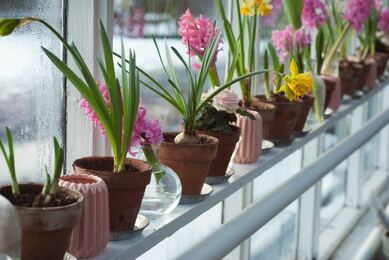
USING TEA LEAVES IN YOUR GARDEN
Share
Spring has officially sprung! Flowers are blossoming, bees are pollinating, and we're trading our favorite hot tea blends for bright, refreshing iced tea blends! With the warmer weather, I find myself outside daydreaming about how to make my garden look even more amazing this year! Did you know that your used tea leaves can be repurposed in your garden? Keep reading to learn how to help your garden thrive by repurposing your used tea leaves! 👇

Your garden receives lots of benefits when adding recycled tea leaves to it. Tea leaves have a high nitrogen content, and they add nutrients to your plants as the tea leaves slowly release them into the soil. The soil drainage also increases, which helps with aeration at the roots and helps the soil retain moisture.
There are a couple of ways you can add tea leaves to your garden:
- As a mulch
- Composting
When you add the leaves as a mulch, simply add a layer of them (about 3-4 inches thick) to the top of the soil, without letting the tea leaves touch the base of the plants. Not only do they release nutrients into the soil, but used tea leaves can also regulate the temperature of the roots, so they don't get too hot or too cold. As the layer of tea leaves block the sunlight from the soil, weeds are prevented from germinating and taking over the garden.

The other way to add the used tea leaves to your garden is through composting.
If you are unfamiliar with composting, it is simply gathering a bunch of organic matter into a pile or bucket, so that they decompose and break down into a nutrient-rich fertilizer, similar to manure. The decomposition process can take several weeks, but it is simple to do, great for your garden, and gives purpose to waste we usually just send off to landfills.
We recommend keeping a small bucket inside to fill daily with compostable material and dumping each afternoon into your outdoor compost heap. For a healthy compost heap, you'll want a good balance of nitrogen matter (food scraps, tea, coffee grounds, etc...) and carbon matter (twigs, newspaper, cardboard, dried grass, etc...). The goal is to have twice as much carbon matter as nitrogen matter: if not, your compost may stink.

I remember when I first learned about composting: I was in my AP Biology course in high school and I thought it was so fascinating! Most of what you'll find in a landfill is made up of compostable material, which release environmentally harmful methane gases into the atmosphere. By composting, you can significantly reduce the amount of methane gas released, and therefore reduce your impact on the environment! The average American will waste over 200 pounds (more than $1,500) of food each year. By composting, you'll give new purpose to your unwanted food and, if used in your garden, may be able to grow more of your own!
My husband and I recently bought a house, and with spring in the air, I am ready to add a bee friendly garden to my front yard! I am so excited to start my own compost! With my recycled tea leaves and other compostable material from my kitchen, I know I'll reduce my impact! 🌱
